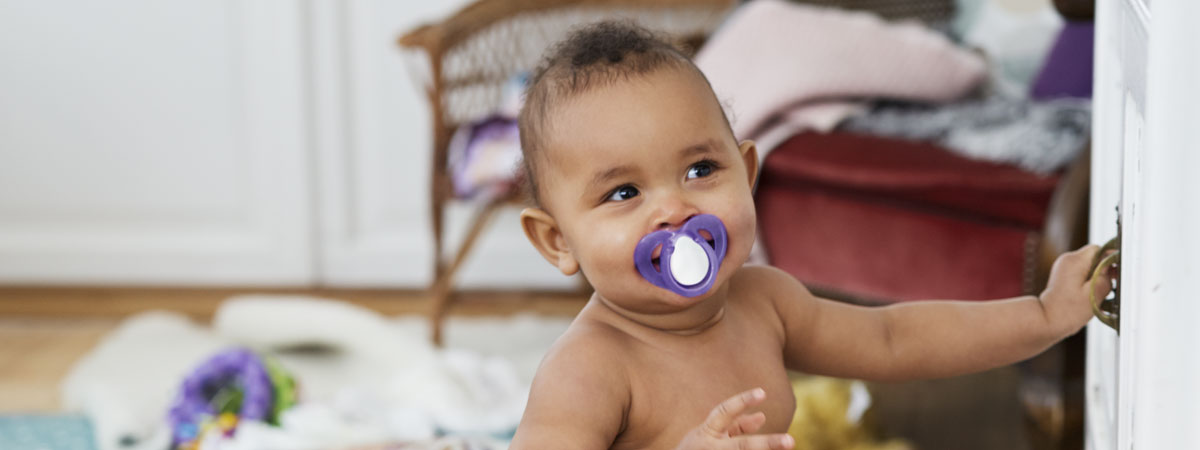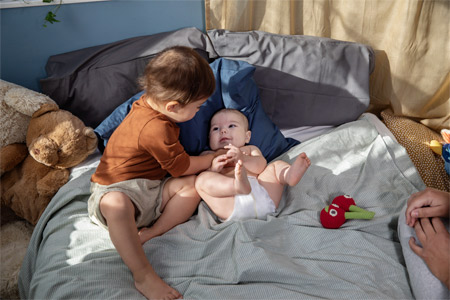Childproofing your home – checklist

Child safety and making sure you have a childproof home is important to many parents. But when should you start childproofing your home and what should you be aware of? Here is a short checklist of the most common tips to reduce the risk of accidents at home.
Your home should be a safe place for your child. But since it is also the place where we spend the majority of our time, it is also where the vast majority of accidents and injuries occur. One of the most common reasons for accidents at home is that something unexpected happens, something that distracts the parent. Of course, it’s hard to avoid the unexpected, but you can try to minimise the risks by being aware that distractions can happen and trying to childproof your home. Of course, accidents can still happen even if you’ve followed the advice to the letter – but at least by following the tips on the childproofing checklist, there’s less chance of your baby having an accident.
It is also good to know that when your baby is around 7–8 months old, the health centre can make a home visit if you wish, where you can go through what needs to be childproofed at home.
Child safety for newborns
Burns and falls are the most common ways newborns get injured. For example, falling off a changing table while unattended or being scalded by hot coffee or tea unfortunately happens more often than you think. Here are some tips on how to childproof for your little one:
- Wait for hot drinks to cool down! When having a hot drink and wanting – or needing – to hold your baby at the same time, you can avoid spilling hot liquids and scalding your baby by letting the cup of coffee or tea cool down for a while before you drink it.
- Never leave your baby unattended on the changing table when changing a nappy, don’t even take your eyes off them! If you have to turn away to pick something up, put a hand on your baby’s tummy so you can feel them all the time. If you need to move further away from the changing table, take the baby with you, or simply take the baby off the changing table.
- If you use a car seat or bouncer for your baby when you are at home, always place them on the floor, never on the table – and with an adult nearby.
- Keep an eye on small objects. As soon as your baby starts getting curious about putting things in their mouth, you need to make sure there are no small objects that your baby can reach and risks choking on. The same applies to all types of teething toys – make sure they are intact and have no small parts that can come off. If you’re not sure how small is too small, you can buy a choking checker to make sure the toy is the right size.
- Keep newborn babies’ beds free from cuddly toys and heavy blankets that can end up covering their faces.
- Check that dummies are intact.
Childproofing from the moment your baby starts sitting up
You don’t need to childproof drawers or windows yet, but a small child sitting up has an unexpectedly large range of motion. Especially as soon as your back is turned.
- Don’t leave hot coffee or tea unattended on a table that the child can reach. Cold coffee may stain, but hot coffee can burn your baby.
- Use a harness in highchairs and pushchairs.
- Keep a non-slip mat in the bath and never leave a baby (or older child for that matter) alone in the water! A child can drown in very little water, and you can’t hear when it happens.
- Lower the base of the crib – it is very easy for an excited child to fall over the edge.
Childproofing from the moment your child starts crawling, standing, walking and climbing
From the time your baby starts to move around on their own, much of your time will be spent on injury prevention. Most children push their boundaries to discover and learn more – which means you’ll find yourself racing for the stairs, the oven door or the remote control. Broadly speaking, it is now time to:
- Use anti-tip devices to secure the cooker and use the trays furthest in where the child cannot reach. The oven door may also need a lock.
- If you have stairs in your home, put gates at the top and bottom.
- Childproof electrical sockets with plug covers, as the most common cause of electrical injuries in young children is them inserting an object into the socket. If your child gets shocked, for example while at home or by an electric fence around animals on an outing, always seek medical attention.
- Put edge protectors on sharp table edges to cushion a crash.
- Do you live on a high floor? Remember to childproof windows and balcony doors with safety locks.
- Move knives and other sharp kitchen utensils out of the reach of small children or put a lock on drawers and cabinets so that they cannot be opened with a single pull.
- Pack away plastic bags – or tie them in a tight knot.
- Suspend the use of tablecloths for a while. These can be very exciting for a baby to pull on, but if there’s stuff on the table, it’s easy for the baby to pull everything onto their head.
- Make sure that curtain and blind cords are tied up and out of your child’s reach.
- Store toxic substances such as cleaning products, detergents and medicines in cabinets that are out of the reach of children. You should also keep iron tablets and vitamins out of your child’s reach.
- If you have a fireplace or stove at home, remember that it is extremely easy for children to burn themselves. Light a fire when the little one is sleeping, or put a good fire guard in front of it.
- Remember that some houseplants are toxic – find out which ones by contacting your local poison information centre.
- It can be difficult to childproof a garden, but if you have one, it’s good to know that there are some plants that are very poisonous, both to adults and children. You can also find out more from the local poison information centre. In addition, it may be wise to keep your sharp tools organised and out of the reach of small, agile children’s hands.
- Anchor any furniture your child may try to climb on to the wall. Or remove anything that you can temporarily. Because even if you’re upset about losing your favourite desk, remember that this is just temporary – before you know it your child will have found a new challenge and you can gradually let your childproof home return to what it was before.
More tips to prevent accidents and increase your child’s safety at home:
In addition to concrete tips on childproofing kitchen drawers or never leaving your baby on the changing table, there are some other things to consider when you have a little one at home.
- – Keep the telephone number of the local poison information centre readily available, and always call your country’s emergency number if you need urgent help.
- – Does your baby have an older sibling (who isn’t old enough to understand that you can’t just give anything to the younger sibling)? If yes, you need to keep this in mind and not leave them unattended without knowing what they are up to.
- – Take a first-aid course to learn basic techniques such as mouth-to-mouth, cardiopulmonary resuscitation (CPR), and what to do if a child chokes – it can be lifesaving.
- – Always use an approved car seat adapted to your child’s age. The Swedish National Road Safety Association (NTF) has lots of important information on how to travel safely with young children.
- – Childproof iPads, mobile phones, TVs and other tech. Not only are these gadgets fragile and expensive – their content isn’t always suitable for children. So as well as making sure they’re out of reach of little ones, it can be wise to childproof apps and video services so that an older child doesn’t end up exposed to content you don’t want them to see, just because your algorithms suggest it.
Please note that all information above is based on Swedish recommendations.


